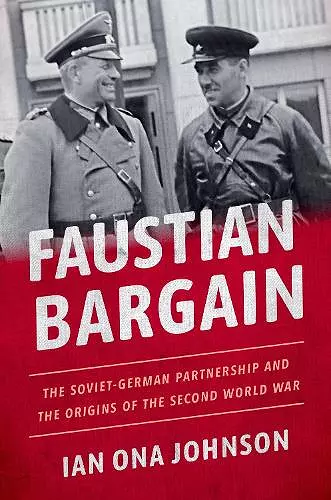Faustian Bargain
The Soviet-German Partnership and the Origins of the Second World War
Format:Hardback
Publisher:Oxford University Press Inc
Published:25th Nov '21
Should be back in stock very soon

When Nazi Germany invaded Poland on September 1, 1939, launching World War Two, its army seemed an unstoppable force. The Luftwaffe bombed towns and cities across the country, and fifty divisions of the Wehrmacht crossed the border. Yet only two decades earlier, at the end of World War One, Germany had been an utterly and abjectly defeated military power. Foreign troops occupied its industrial heartland and the Treaty of Versailles reduced the vaunted German army of World War One to a fraction of its size, banning it from developing new military technologies. When Hitler came to power in 1933, these strictures were still in effect. By 1939, however, he had at his disposal a fighting force of 4.2 million men, armed with the most advanced weapons in the world. How could this nearly miraculous turnaround have happened? The answer lies in Russia. Beginning in the years immediately after World War One and continuing for more than a decade, the German military and the Soviet Union--despite having been mortal enemies--entered into a partnership designed to overturn the order in Europe. Centering on economic and military cooperation, the arrangement led to the establishment of a network of military bases and industrial facilities on Soviet soil. Through their alliance, which continued for over a decade, Germany gained the space to rebuild its army. In return, the Soviet Union received vital military, technological and economic assistance. Both became, once again, military powers capable of a mass destruction that was eventually directed against one another. Drawing from archives in five countries, including new collections of declassified Russian documents, The Faustian Bargain offers the definitive exploration of a shadowy but fateful alliance.
Readers interested in the technical aspects of experiments and in the development of prototypes will benefit from this book. Regarding the political aspects of the cooperation, Johnson confirms the assumptions of the authoritative literature. * Dietrich Beyrau, H/Soz/Kult *
The strength of Johnson's work is that he clearly illustrates that most of the Reichswehr's top leadership had been on board for a war of revenge to assert Germany's primacy on the continent well before Hitler and the Nazis came to power. * Roger R. Reese, Texas A&M University, The Russian Review *
Johnson's book is a revelation and a triumph. It lays bare one of the least-known and least-understood of inter-war relationships – the odious pariahs' dance between Germany and the Soviet Union. Well-written and academically impeccable, it is an essential read for everyone interested in the period. * Roger Moorhouse, author of Poland 1939: The Outbreak of World War II and The Devils' Alliance: Hitler's Pact with Stalin, 1939-1941 *
Ian Johnson has done extraordinary research, drawing on twenty-three archives in five countries and three languages, which allows him to tell a highly original story: How the German-Soviet partnership of the early 1920s lay at the foundation of European politics in the two decades that followed, helping to determine Stalin's Terror, the German army's virulent contempt for Bolshevism, and ultimately the outbreak and conduct of the Second World War and the Holocaust. This is one of the most important and readable books in years on this critical period. * Benjamin Hett, author of The Nazi Menace: Hitler, Churchill, Roosevelt, Stalin, and the Road to War *
Ian Johnson's compelling study is a major contribution to twentieth century history.Based on significant research, this study takes forward our knowledge of an important aspect of the background to World War Two. * Jeremy Black, author of Rethinking Military History *
Compelling, elegantly written, and based on meticulous excavation of the archives, Ian Ona Johnson's book forces a reckoning with the interwar continuity of relations between the Soviet Union and their German partners—Weimar and Nazi alike. It reveals in captivating detail how Germany's clandestine rearmament shaped the Nazi German Wehrmacht, the Soviet Red Army, and the ultimate destabilization of Europe. * Jennifer Siegel, The Ohio State University *
This is an important book nonetheless for revealing the full nature of the Soviet-German relationship in the 1920s and early 1930s,...The writing is clear and there is an image section that is as original as the main subject area of the book. * Richard Overy, University of Exeter *
This is a well-written and extremely well-documented treatment of the subject. * Evan Mawdsley, University of Glasgow, Journal of Modern History *
- Winner of Winner of the Society for Military History Distinguished Book Award for First Book.
ISBN: 9780190675141
Dimensions: 163mm x 241mm x 31mm
Weight: 680g
384 pages